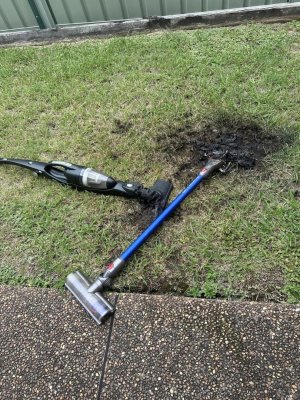Homeowner's nightmare: Popular vacuum combusts, prompting fire hazard warnings
- Replies 9
In a shocking incident that has left many homeowners on edge, a Dyson cordless vacuum cleaner burst into flames while charging inside a residential unit in Swansea, on the NSW Central Coast.
The incident, which occurred around 1 pm on Sunday, 11 February, has raised serious questions about the safety of these popular household appliances.
According to a report by Fire and Rescue NSW (FRNSW), the vacuum cleaner's Lithium-Ion battery was the culprit, igniting and causing the fire to spread to a second vacuum cleaner stored nearby. The resident, who was cooking in the next room, was alerted to the fire by the smoke alarm.
Thanks to the alarm, the homeowner and their neighbours were able to respond quickly, removing both vacuums from the unit and extinguishing the fire with water.
FRNSW crews from Swansea, Belmont, Tingira Heights and Wallarah were then dispatched to the scene, where they ventilated the unit and placed the battery in a bucket of water to prevent re-ignition.
The fire caused minor damage to the unit, but thankfully, no one was injured.
In the wake of this incident, FRNSW has issued a public warning to remain vigilant around Lithium-Ion batteries, especially when they're charging.
They also stressed the importance of having at least one working smoke alarm in every home.
‘Ensure your home is fitted with at least one working smoke alarm and maintain a home safety escape plan,’ they said in their report.
The FRNSW also provided further guidelines for handling Lithium-Ion batteries in electronics and other portable devices. You may find them here.
Meanwhile, Dyson, the manufacturer of the vacuum cleaner, has yet to comment on the matter.
When a Lithium-Ion battery fails, it can lead to a phenomenon known as 'thermal runaway'. When this type of battery overheats, it produces a chemical reaction that creates even more heat inside the battery cell, which could potentially catch fire or explode. This can be triggered by physical damage, short-circuiting, overcharging, or exposure to extreme temperatures.
While incidents like the one in Swansea are relatively rare, they serve as a stark reminder of the potential dangers associated with these batteries. It's crucial to follow the manufacturer's instructions when charging devices and to avoid leaving them charging unattended or overnight.
 Have you experienced similar issues with your household appliances? Share your experiences in the comments below.
Have you experienced similar issues with your household appliances? Share your experiences in the comments below.
The incident, which occurred around 1 pm on Sunday, 11 February, has raised serious questions about the safety of these popular household appliances.
According to a report by Fire and Rescue NSW (FRNSW), the vacuum cleaner's Lithium-Ion battery was the culprit, igniting and causing the fire to spread to a second vacuum cleaner stored nearby. The resident, who was cooking in the next room, was alerted to the fire by the smoke alarm.
Thanks to the alarm, the homeowner and their neighbours were able to respond quickly, removing both vacuums from the unit and extinguishing the fire with water.
FRNSW crews from Swansea, Belmont, Tingira Heights and Wallarah were then dispatched to the scene, where they ventilated the unit and placed the battery in a bucket of water to prevent re-ignition.
The fire caused minor damage to the unit, but thankfully, no one was injured.
In the wake of this incident, FRNSW has issued a public warning to remain vigilant around Lithium-Ion batteries, especially when they're charging.
They also stressed the importance of having at least one working smoke alarm in every home.
‘Ensure your home is fitted with at least one working smoke alarm and maintain a home safety escape plan,’ they said in their report.
The FRNSW also provided further guidelines for handling Lithium-Ion batteries in electronics and other portable devices. You may find them here.
Meanwhile, Dyson, the manufacturer of the vacuum cleaner, has yet to comment on the matter.
When a Lithium-Ion battery fails, it can lead to a phenomenon known as 'thermal runaway'. When this type of battery overheats, it produces a chemical reaction that creates even more heat inside the battery cell, which could potentially catch fire or explode. This can be triggered by physical damage, short-circuiting, overcharging, or exposure to extreme temperatures.
While incidents like the one in Swansea are relatively rare, they serve as a stark reminder of the potential dangers associated with these batteries. It's crucial to follow the manufacturer's instructions when charging devices and to avoid leaving them charging unattended or overnight.
Key Takeaways
- A Dyson cordless vacuum cleaner caught fire while charging, causing a small fire in a home on the NSW Central Coast.
- The incident occurred around 1 pm on Sunday and was contained after the vacuums were removed and the fire extinguished with water.
- FRNSW attended the scene, ventilating the unit and ensuring the battery was cooled to prevent re-ignition.
- FRNSW issued a warning to be vigilant with Lithium-Ion batteries, particularly while charging, and highlighted the importance of working smoke alarms and a home safety escape plan.
- When a Lithium-Ion battery overheats, it could lead to a phenomenon called ‘thermal runaway’, which produces a chemical reaction that could potentially lead to fires.








